Description
Beginning of Guidance
Hanbali Fiqh & Objectives of Worship
Purification, Prayer, Fasting, Zakah, & Hajj
in collaboration with UMMA Michigan
Islam recognizes that practice of faith is an integral. Belief is not considered sound without action. Hence why four out of the five pillars of Islam are in relation to actions. Unfortunately though the prism in which the legality of soundness of doing deeds has been discussed has sometimes not emphasized enough elements of sincerity and spirituality which are as integral.
Scholars of Islam discussed the holistic conceptualization of servitude within the actions of faith, the importance of the heart in one’s application, and awareness of the spiritual impact on one’s actions outside of relegating ritual to simply the motion of action.
They delved into expounding how the motion of worship reflects on the complete being of a person, their character, and translates from motion to devotion.
Scholars of the Islamic tradition emphasized how important meaningful action is if it fulfills the condition of being done correctly and accordance to guidance. They further related how the way the Prophet Muhammad ﷺ taught the faith of Islam holistically without compartmentalization and exemplified the depth of faith in its integrals being made up of both actions and belief, spirituality and mechanics, and heart and body. He taught how these dimensions are understood through the three components and levels of faith of Islam, Iman, and Ihsan; as some scholars further referred to as shariah (law) and haqiqah (reality).
As jurisprudence developed into the science of ascertaining legality, elements of spirituality were relegated to separate texts from the holistic faith approach and in turn, unfortunately in the minds of some, caused a separation of the inseparable, of spirituality separated from ritual.
This course explores worship beyond the scope of ritual legality. It will infuse spirituality in achieving meaningful prayer. Motion becomes devotion through purification of heart, mind, and action.
We will study Hanbali Fiqh of Worship via Umdat Al Fiqh of Imam Ibn Qudamah and other Hanbali texts as well as works in spirituality by Imam Al Ghazali, Shah Waliullah Al Dehlawi, Al Nawawi, and others رحمهم الله
What you will learn in this course:
Beginning of Guidance 1:
- Why do we study Fiqh? The Importance of Fiqh
- The Objectives of Fiqh
- Brief Overview of the Development of Fiqh. The importance, uniqueness, and validity of the Schools of Fiqh: Imam Abu Hanifah, Imam Malik, Imam Al Shafi’I, Imam Ahmad, and others رحمهم الله
- Differences of Opinion: What is valid and invalid?
Respecting differences in navigating our own practice. - Navigating Madhabs, Fatwa, and Judicial Matters:
Answering – “Do I have to follow a school? Can’t I just follow the Quran and Sunnah? Can we pick opinions from the different schools of fiqh? Etc.” - True Fiqh vs Legality (Fiqh): An Overview of Fiqh and the Inner Meanings of Fiqh
- Introduction to Imam Ahmad رحمه الله and the Hanbali Madhab
- Purification: The Gateway of Prayer
- Purification of Soul and Heart
- The Path: Duties – God, Self, and Others (family, friends, and society)
- Fiqh of Purification alongside Spiritual Elements
- Prayer: The Connection the Almighty
- Stages of Development of Prayer in the Life of the Prophet Muhammad ﷺ
- Fiqh of Prayer alongside Spiritual Elements to Achieve Meaningful Prayer
- Contemporary issues will be discussed when applicable
Beginning of Guidance 2:
- Importance & Development of Legislation of Fasting in Islam
- The Quran’s Conceptualization of Fasting
- The Objectives of Fasting
- Fasting: The Gateway to Taqwa (Consciousness of Allah)
- Purification of Soul and Heart
- The Levels of Fasting
- Ramadan: A practical breakdown of how to make the best of the blessed month
- Fiqh of Fasting
- Contemporary issues related to fasting will be discussed when applicable
Beginning of Guidance 3:
- Importance & Historical Development of the Legislation of Zakah & Hajj in Islam
- The Quran’s Conceptualization of charity & its direct relationship to purification before responsibility toward the less fortunate.
- The Objectives of Zakah
- Fiqh of Zakah
- Differentiating between Sadaqah & Zakah
- 8 Categories of those deserving Zakah
- Who owes Zakah? When does one own Zakah?
- How to calculate Zakah: in assets, investments, business, etc.
- Contemporary issues related to Zakah will be discussed when applicable:
– Can we give Zakah to masjids/dawah organizations/schools etc?
– Are relatives deserving of Zakah?
– Can Zakah be given abroad or must it be given locally?
and more.
- The Objectives of Hajj & Umrah
- Fiqh of Hajj
- When is Hajj an obligation? Can I perform Umrah without having done Hajj? Can I make Hajj if I have debt? Do I need to wait to get old to do Hajj?
- The 3 types of Hajj: is there a preferred way to make?
- Contemporarizing the Hajj and what to consider in our modern journey in Hajj
- How to perform Hajj: In the footsteps of the Prophet peace be on him on his Farewell Hajj
- For those who cannot go to Hajj
- The best days of the year: The 1st 10 Days of Dhul Hijjah
- Access to ask open Question and Answer
Required Texts:
- Umdat Al Fiqh (will be provided for you)
Who Is this For?
This course is suitable for anyone interested in a comprehensive seminar that caters to discussing the spiritual components of worship. Audiences should be able to cognitively understand the material and ask poignant questions (the class is not suitable for children who cannot).
Your Instructor

Timings:
May 30 – Sep 5
Tuesdays – 7pm to 930pm EST
This page is for ONLINE attendance and registration only.
This class will be taught LIVE and In-Person at UMMA Michigan – for those attending live & in person – Please Register by Clicking Here
Classes will be live streaming and recorded On-Demand for viewing. Students will be added to a group to ask questions and participate.
Stay updated on social media – @thelegacyi
Questions or Inquiries, please email: admin@legacy.institute
*This course is not refundable.


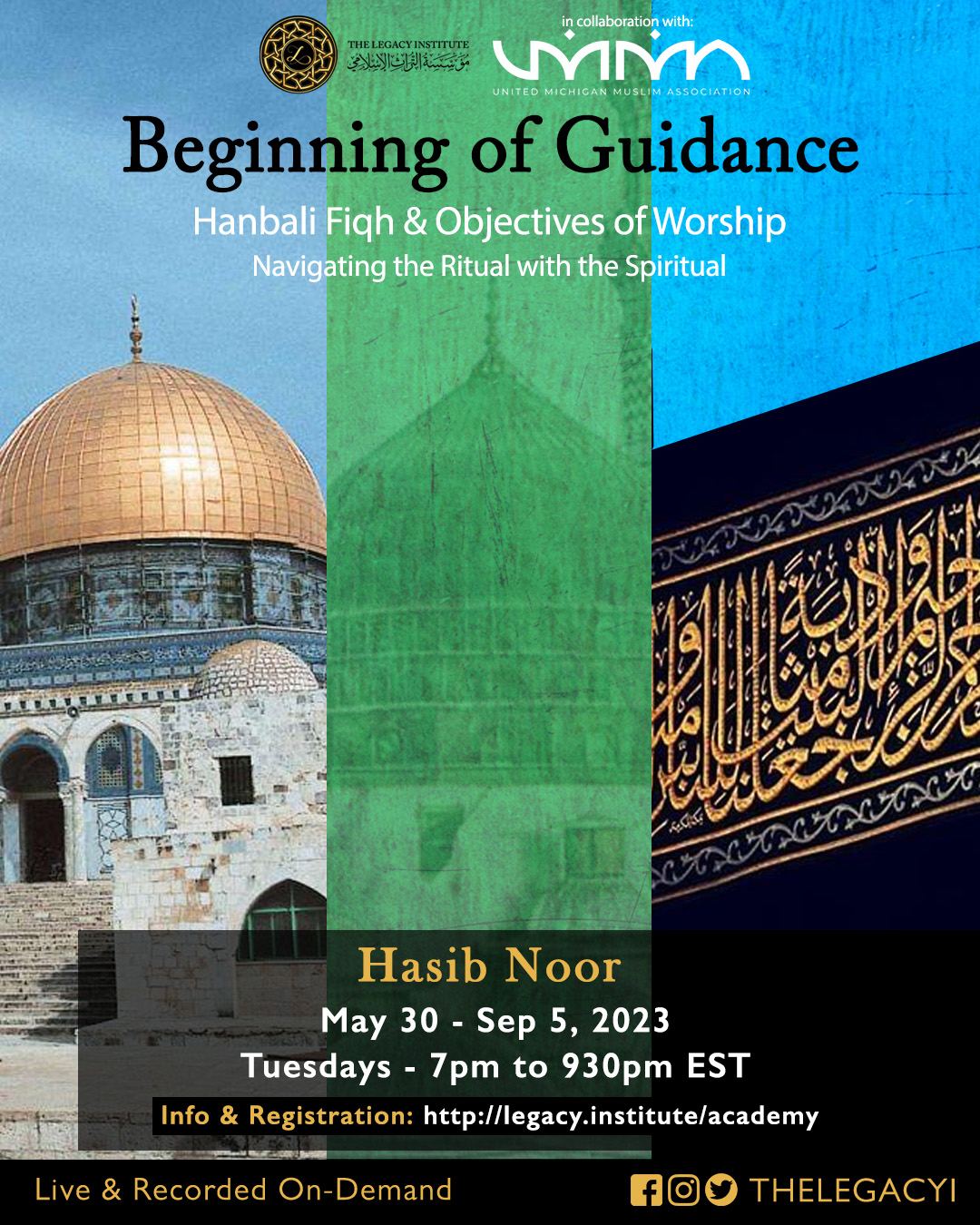
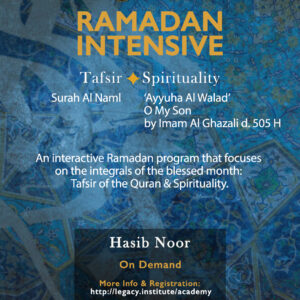
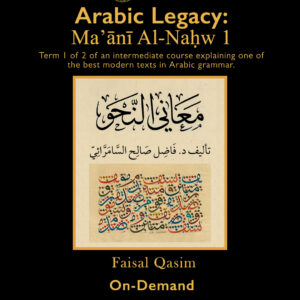
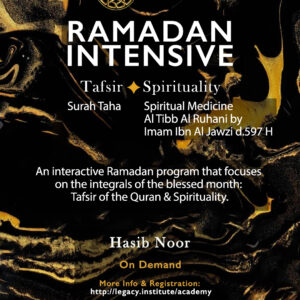
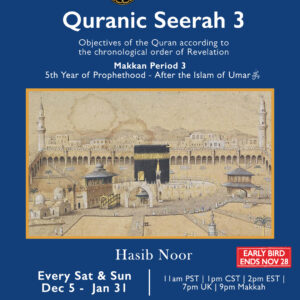
There are no reviews yet.